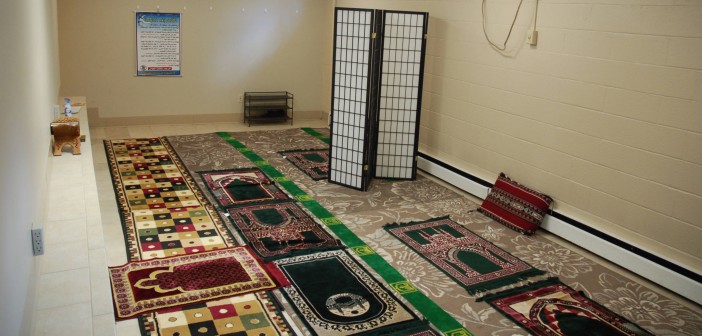Growing up, Todd Austin, ‘16, attended church regularly. He described his faith prior to college as “not that serious,” but he started going to Intervarsity — an evangelical Christian campus ministry — at Lehigh “just to keep things normal.”
“I learned a lot more about what it means to follow Jesus,” Austin said. “It was a much bigger picture of faith than I had ever seen before… It’s been much more fulfilling and life-giving than I could ever imagine it could be.”
Austin is now the president of Intervarsity.
Austin’s story isn’t unique. Across many religions represented at Lehigh, some students find their faith is strengthened when they come to college.
“When students come to college, it’s the first time they have a choice about religion,” said Rabbi Danielle Stillman, the director of Jewish Student Life and associate chaplain. “For the students who choose to do religious activities in college, it’s very empowering, because they’re doing it on their own.”
Devika Gupta, ‘16, president of the Hindu Students Organization, grew up with religious parents. Coming to Lehigh, she had the freedom to practice Hinduism in a way that was comfortable for her.
Students might find their religious practices differing at school than how they were practiced at home.
“For many students who’ve grown up in households where religion has been emphasized, college is a time where those bonds can be loosened,” said University Chaplain Lloyd Steffen, who is also the director of the Dialogue Center and a professor of religion studies.
Like Gupta, the co-president of Hillel Society Shira Morosohk, ‘18, said it’s important to find your own version of the religion that you grew up with.
Austin, Gupta and Morosohk have all found confirmation in their faith during their time at Lehigh, but that doesn’t make practicing their respective religions at college easy.
Austin said continuing the process of looking into your faith often takes a backseat to keeping up with schoolwork.
“It’s pretty challenging to make it a priority,” he said.
Additionally, Austin said campus and societal culture emphasizes looking out for oneself. College students are often told this is the time to be selfish, but Christianity emphasizes looking out for other people and investing in them, both in their regular lives and spiritual lives. He said at Lehigh, people are typically accustomed to partying and talking about school.
“I intentionally try not to segment parts of my life between school, being at home and being with my friends,” Austin said. “I gain integrity in bringing my values to all parts of my life.”
But for other religions, students find that the university isn’t as accommodating or convenient for their spiritual needs.
Zakaria Hsain, ‘17, the president of the Muslim Students Association, prays five times per day as part of his religious practice. The Dialogue Center has a prayer room for Muslim students, but that’s the only space, and Hsain has to schedule his day around that availability.
The chaplain has been helpful, but Hsain said it’s challenging because the people who are working to create the environment Muslims need are mostly students. He said that many universities have Muslim chaplains.
Hsain isn’t discouraged, though.
“Faith in general is not something that stays constant,” he said. “It goes up and down. College is a time of trial and time of test.”
During Lent, Catholics don’t eat meat on Fridays, which makes lunch particularly difficult on chicken finger Fridays.
However, Hsain said Lower Cort offers halal, or foods that are permissible for Muslims to eat or drink under Islamic law, on Wednesdays at dinner. There’s an effort to expand this to Rathbone as well.
“You just have to communicate with the right people,” Hsain said.
It’s not just students who grew up with religious families that explore faith in college. Intervarstiy, Hindu Student Organization, Hillel and the Muslim Student Association all see students with no religious background at their respective events.
Across all religions, students are looking for community, purpose and the opportunity to be a part of something bigger than themselves.
“If you limit religion to those ritual acts, you strip it of its essence,” Hsain said.
Khurram Hussain, an assistant professor of religion studies and faculty adviser to the Muslim Student Association, said religion as a community is just as important as religion as a belief.
This notion is true of the Jewish community at Lehigh. Stillman, Morosohk and Horowitz all said many students identify as culturally Jewish but not religious. Stillman wonders where the line is drawn. Stillman said, if one observes Passover as part of their culture and another does it as part of their religion, it looks exactly the same — so what’s the difference?
Additionally, religion is not the only way that students grow spiritually at college.
“Spiritual growth is really important in that process of maturing as a whole person and developing your values and making your own decisions,” Intervarsity staff member Caroline Tolli said. “Students are still hungry to know the answers to basic questions about life and belonging and purpose.”
Mindfulness Meditation meets Mondays from 4:15-5 p.m. at the Dialogue Center. The practice has its roots in Buddhism, but the group is not particularly religious. According to Stillman, meditation can help refocus energy, and it’s an opportunity to have a moment of quiet during the day where one can connect to something deeper.
“Even in the minute you’re not busy, most of us feel compelled to look at our phones,” Stillman said. “Permission to not be doing anything is a radical spiritual practice.”
Steffen — who is also in charge of Lehigh’s Prison Project, which tutors inmates at Northampton County Prison — said community service provides an opportunity to grow spiritually. Many students sign up to volunteer as a resume builder, but Steffen says walking through the prison is a humbling experience.
A group that isn’t represented by an organization on campus is students who are not affiliated with any religion.
None of the Above, a group for atheists, agnostics and skeptics, was created about four years ago and more than 30 people, students and faculty, attended the first few meetings. The students who started the group have since graduated and the organization is now inactive. Steffen, who oversaw the meetings, said the students felt that campus was oppressive because of the Christian presence.
“The ability to meet with people to talk about big issues is important to having a fulfilled life, whatever your age,” Steffen said.






Comment policy
Comments posted to The Brown and White website are reviewed by a moderator before being approved. Incendiary speech or harassing language, including comments targeted at individuals, may be deemed unacceptable and not published. Spam and other soliciting will also be declined.
The Brown and White also reserves the right to not publish entirely anonymous comments.